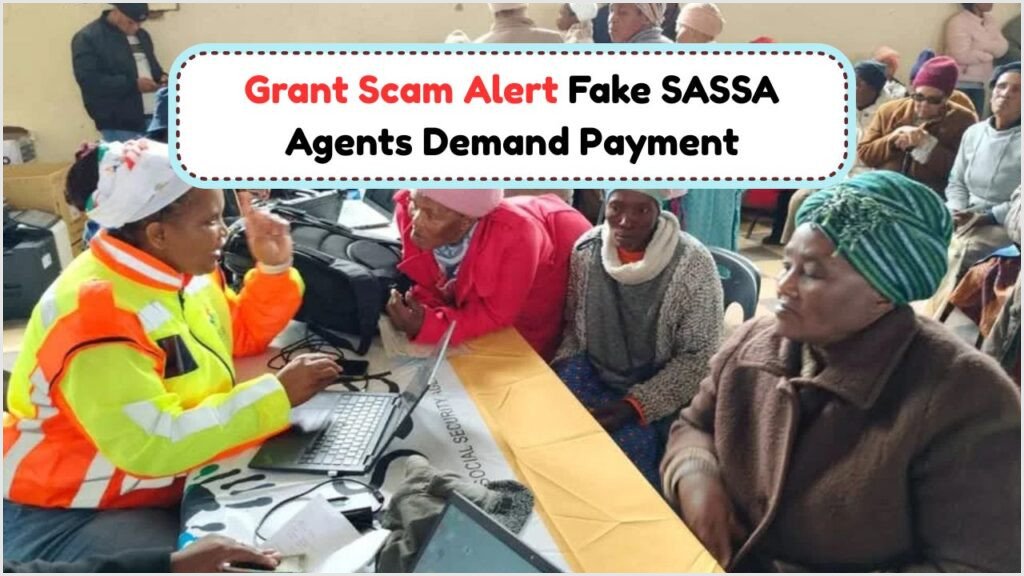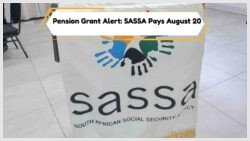SASSA Scam Alert: In recent years, South Africa has seen a worrying rise in scams targeting SASSA beneficiaries, luring them into paying unnecessary registration fees. These scams exploit vulnerabilities, promising fake benefits and preying on the desperate. It’s crucial for every South African, especially those relying on social grants, to stay informed and vigilant against these fraudulent schemes. Understanding the nature of these scams and knowing how to protect oneself is vital in safeguarding your finances and personal information. This article aims to shed light on these scams, offer advice on how to spot a scam, and provide actionable steps to protect yourself and your loved ones.
Understanding the SASSA Scam Alert
With the increase in online scams, the South African Social Security Agency (SASSA) has become a prime target for fraudsters. These scams often involve imposters posing as SASSA officials to trick beneficiaries into paying registration fees for grants or other benefits. It’s essential to understand that SASSA never charges any fees for registration. If you ever receive communication claiming otherwise, it’s an immediate red flag. Fraudsters employ various tactics, including social media posts, emails, and even phone calls, to convince victims of their legitimacy. Staying informed about these tactics is the first step in protecting yourself.
 Discover the Fastest Way to Unlock NSFAS Funds: Thousands Swear by This Proven Appeal Format!
Discover the Fastest Way to Unlock NSFAS Funds: Thousands Swear by This Proven Appeal Format!
- Always verify the source of any SASSA-related communication.
- Be skeptical of any request for personal or financial information.
- Report suspicious activity to local authorities immediately.
- Educate family and friends about current scams.
- Keep your personal details secure and private.
- Stay updated through official SASSA channels.
- Be cautious of offers that seem too good to be true.
How to Recognize a SASSA Scam
Recognizing a scam can be challenging, especially when fraudsters use sophisticated methods to disguise their intentions. However, there are tell-tale signs that can help you identify a scam. Legitimate SASSA communications will never ask for payment upfront or personal information via email or phone. Scams often contain urgent language, pressuring you to act quickly to avoid losing benefits. Additionally, fraudulent emails may have poor grammar or spelling errors, which is another sign of a scam. If you receive any unsolicited communication from someone claiming to be from SASSA, it’s best to contact SASSA directly to verify its authenticity.
| Indicator | Legitimate SASSA | Scam |
|---|---|---|
| Registration Fee | No fee charged | Fee requested |
| Communication Channel | Official channels | Unverified sources |
| Urgency | Informative | Urgent/Threatening |
| Language | Professional | Poor grammar |
Steps to Protect Yourself from SASSA Scams
Taking proactive steps to protect yourself can save you from falling victim to SASSA scams. First, always question the authenticity of any communication regarding social grants. Verify the information by contacting SASSA directly using official contact details. Never share personal information over the phone or online unless you are absolutely sure of the recipient’s identity. Keeping your SASSA card and PIN safe is crucial, as well as regularly checking your bank statements for any unauthorized transactions. By staying informed and cautious, you can effectively shield yourself from scams.
 August 17, 2025: R1,250 Foster Child Grant Payout Begins – Ensure You Receive Your SMS Alert!
August 17, 2025: R1,250 Foster Child Grant Payout Begins – Ensure You Receive Your SMS Alert!
- Verify Information: Always cross-check any information received with official sources.
- Secure Personal Data: Keep your personal and financial information private.
- Regular Monitoring: Check your bank statements for unusual activity.
- Educate Others: Share scam alerts with family and friends to increase awareness.
- Report Scams: Notify authorities if you suspect fraudulent activity.
Reporting SASSA Scams
If you suspect that you’ve been targeted by a SASSA scam, it’s important to report it immediately. This helps protect others and allows authorities to take action against fraudsters. You can report scams to the South African Police Service (SAPS) or directly to SASSA through their official website. Providing as much detail as possible, including any communication received from the fraudsters, can aid in their investigation. Additionally, informing friends and family about the scam can help prevent them from becoming victims.
| Reporting Channel | Contact Method |
|---|---|
| SAPS | Visit local police station |
| SASSA | Use official website |
| Anti-Fraud Hotline | Call to report |
| Community Groups | Share information |
FAQs about SASSA Scam Alert
Here are some frequently asked questions to further assist you in understanding and preventing SASSA scams:
- What should I do if I receive a suspicious call? Hang up immediately and report the number to SASSA or SAPS.
- Can SASSA ask for my bank details over the phone? No, SASSA will never request sensitive information over the phone.
- How can I verify a message from SASSA? Cross-check with the official SASSA website or contact them directly.
- What happens if I fall victim to a scam? Report the incident to the police and your bank as soon as possible.
Conclusion: Staying Safe from SASSA Scams
In today’s digital age, staying vigilant against scams is more important than ever. The rise in fraudulent schemes targeting SASSA beneficiaries is a serious issue that requires collective awareness and action. By understanding the signs of a scam, taking preventive measures, and knowing how to report suspicious activity, you can protect yourself and others. Remember, no legitimate SASSA process will ask for fees or personal details via unofficial channels. Stay informed, stay safe, and help spread the word to protect your community from these harmful scams.
How can individuals protect themselves from falling victim to the SASSA registration fee scam?
Stay informed and avoid paying any registration fees to unknown sources.
What are common red flags to look out for in the SASSA registration fee scam?
Unexpected requests for payment or personal information.




